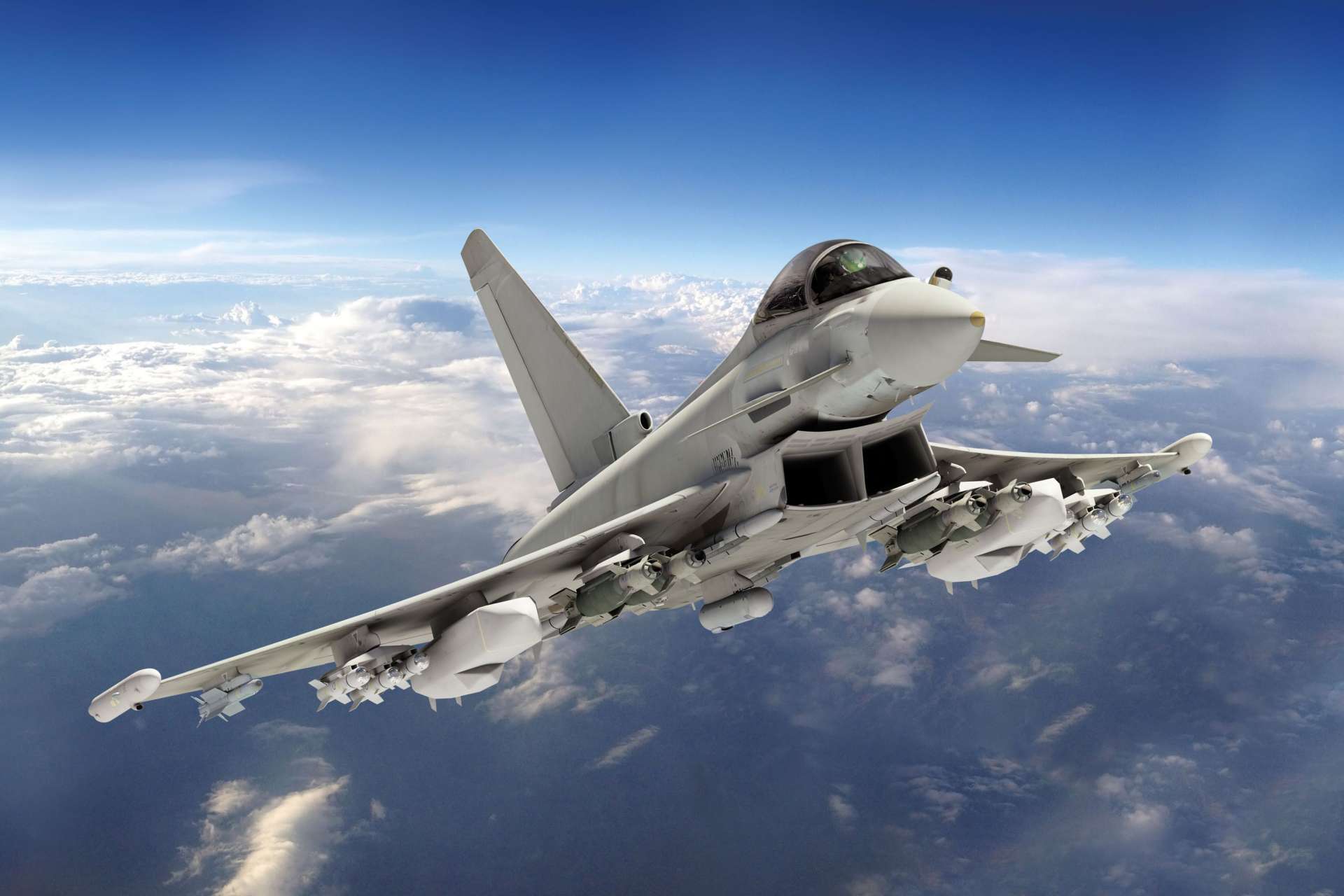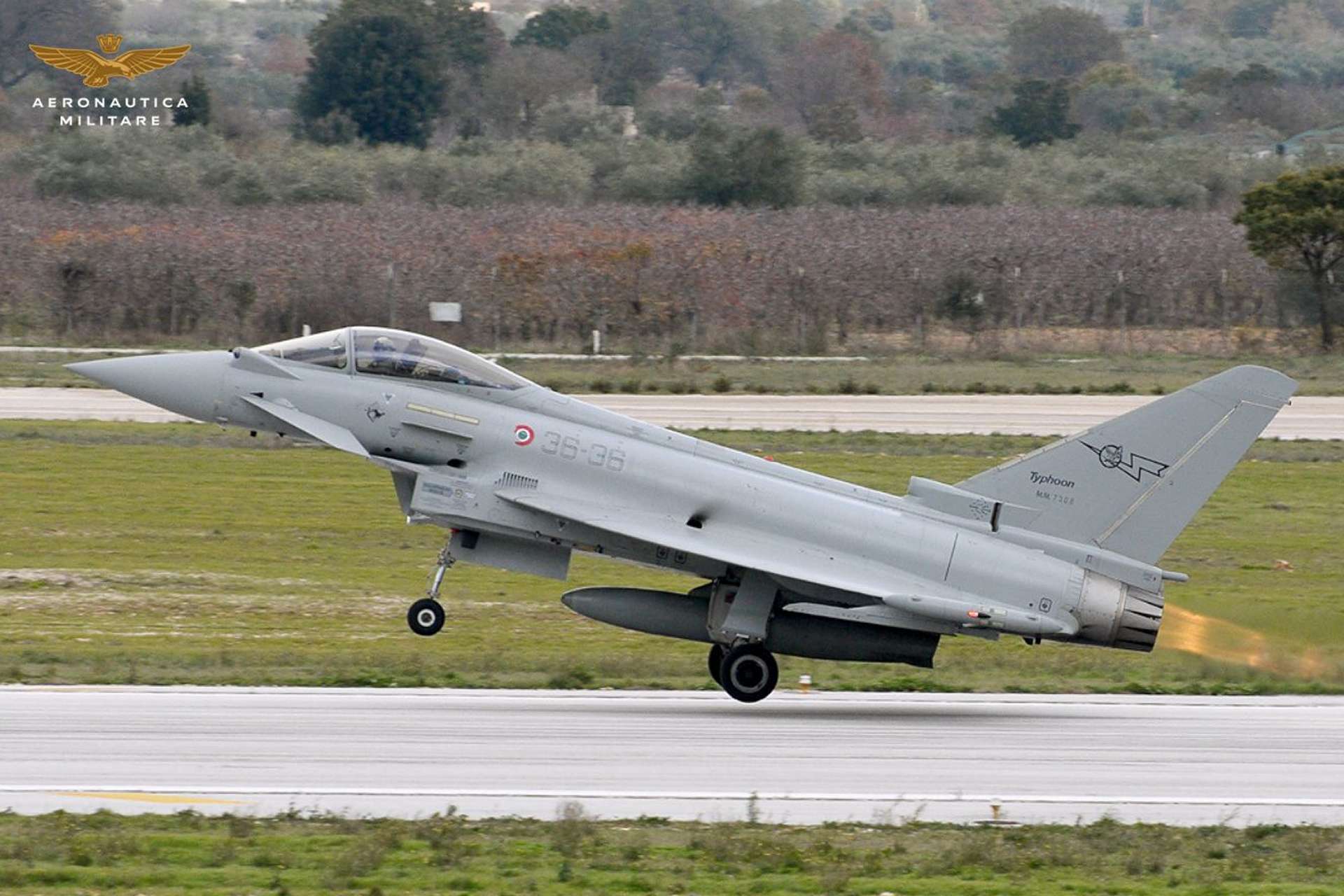Italy plans to purchase up to 24 Eurofighter Typhoon multirole fighters


{loadposition bannertop}
Breaking news
{loadposition sidebarpub}
On May 14, 2024, as reported by Gareth Jennings, Aviation Desk Editor at Jane’s, a spokesperson from BAE Systems confirmed previous speculations about the Italian Air Force’s potential expansion of its Eurofighter Typhoon fleet. Italy is considering the acquisition of more core aircraft, possibly adding 24 additional Typhoon multirole fighters. However, concrete details are yet to emerge, pending the official parliamentary process scheduled for the summer.
Follow Army Recognition on Google News at this link
/* 468×15 data sheet menu top dark green */
google_ad_slot = “3500417247”;
google_ad_width = 468;
google_ad_height = 15;
// ]]>
/* top_468x60_fiche_technique */
google_ad_slot = “2746785843”;
google_ad_width = 468;
google_ad_height = 60;
// ]]>
The Typhoon’s armament includes a 27 mm Mauser BK-27 revolver cannon with 150 rounds and 13 hardpoints (8 under-wing and 5 under-fuselage) capable of carrying over 9,000 kg of payload. (Picture source: Airbus)
Despite inquiries from Gareth Jennings, both the Italian Air Force and Leonardo Aircraft have refrained from providing confirmation or further information. Notably, if Italy proceeds with the purchase, it would align with Germany’s Quadriga and Spain’s Halcon programs, leaving the UK as the only consortium partner without an additional order. BAE spokespersons have also hinted at potential measures to maintain the UK’s standing within the Eurofighter consortium, as other member nations pursue fleet expansions. One consideration is extending the service life of the existing fleet to ensure parity with partner nations.
Over the past 20 years, the Italian Air Force, which currently operates 94 Eurofighter Typhoons, has achieved more than 80,000 flight hours with this type of aircraft. The multirole fighter now equips six squadrons (9°, 10°, 12°, 18°, 20°, and 132° Gruppo) located at four bases: Grosseto, Gioia del Colle, Trapani, and Istrana. The Typhoons provide round-the-clock Quick Reaction Alert (QRA) service both domestically and internationally and are regularly deployed to carry out a variety of roles, including missions exceeding 8 hours in support of the anti-Daesh coalition in Iraq and Syria.
The Eurofighter Typhoon is a multi-role combat aircraft developed by a consortium of European aerospace companies, including Airbus, BAE Systems, and Leonardo. Designed for a wide range of air operations, the Typhoon features a delta wing and canard configuration, providing significant maneuverability. The aircraft is intended to meet both current and future operational needs, with continuous upgrades keeping it updated with combat aviation technology. It has a maximum takeoff weight of 23,500 kg and a maximum speed of Mach 2.0.

The Italian Air Force currently operates 94 Eurofighter aircraft across four squadrons. (Picture source: Italian Air Force)
Powered by two Eurojet EJ200 afterburning turbofan engines, each providing 60 kN (13,000 lbf) of thrust dry and 90 kN (20,000 lbf) with an afterburner, the Eurofighter Typhoon can reach a maximum speed of 2,125 km/h or Mach 2.35 at high altitude and 1,530 km/h or Mach 1.25 at sea level. It has a supercruise capability at Mach 1.5, a maximum range of 2,900 kilometers, and a service ceiling of 19,812 meters (65,000 feet).
The Typhoon’s armament includes a 27 mm Mauser BK-27 revolver cannon with 150 rounds and 13 hardpoints (8 under-wing and 5 under-fuselage) capable of carrying over 9,000 kg of payload. In air-to-air combat, the Eurofighter Typhoon can climb at a rate of 315 meters per second (62,000 feet per minute). It is equipped with advanced radar and targeting systems, including the Captor-E AESA radar, capable of tracking up to 20 targets simultaneously and engaging them with precision. Its armament includes air-to-air missiles such as the AIM-120 AMRAAM, MBDA Meteor, IRIS-T, AIM-132 ASRAAM, and AIM-9 Sidewinder for beyond-visual-range (BVR) engagement.
The Eurofighter Typhoon also performs well in air-to-ground missions. It can carry precision-guided munitions, including Paveway IV laser-guided bombs, Storm Shadow cruise missiles, Brimstone anti-tank missiles, Taurus air-to-surface missiles, and AGM-88 HARM anti-radiation missiles. Its targeting pod, the LITENING III, allows for accurate identification and engagement of ground targets under various weather conditions. This capability supports roles such as close air support, interdiction, and strategic strike missions. Furthermore, the Typhoon can also carry anti-ship missiles such as the Marte ER and the Joint Strike Missile (JSM).
The aircraft’s avionics and electronic warfare systems are advanced. The Defensive Aids Sub System (DASS) offers protection against threats such as radar-guided and infrared-guided missiles. It includes communication and data link systems like Link 16 for integration with other air and ground assets, enhancing situational awareness and coordination in complex environments. Additionally, the Typhoon is equipped with an Infra-Red Search and Track (IRST) system for passive target detection.
Ongoing upgrades and modernization programs help maintain the Eurofighter Typhoon’s operational effectiveness. Recent enhancements include the Phase 4 Enhancement (P4E) package, which integrates the new ECRS Mk2 AESA radar to improve electronic warfare and attack capabilities. This radar can detect, identify, and track multiple targets in the air and on the ground simultaneously. The Praetorian Defensive Aids Sub-System (DASS) is also being upgraded to enhance survivability against modern threats, including infrared and radar-guided missiles, through initiatives such as the Praetorian eVolution roadmap.

{loadposition bannertop}
Breaking news
{loadposition sidebarpub}
On May 14, 2024, as reported by Gareth Jennings, Aviation Desk Editor at Jane’s, a spokesperson from BAE Systems confirmed previous speculations about the Italian Air Force’s potential expansion of its Eurofighter Typhoon fleet. Italy is considering the acquisition of more core aircraft, possibly adding 24 additional Typhoon multirole fighters. However, concrete details are yet to emerge, pending the official parliamentary process scheduled for the summer.
Follow Army Recognition on Google News at this link
/* 468×15 data sheet menu top dark green */
google_ad_slot = “3500417247”;
google_ad_width = 468;
google_ad_height = 15;
// ]]>
/* top_468x60_fiche_technique */
google_ad_slot = “2746785843”;
google_ad_width = 468;
google_ad_height = 60;
// ]]>
The Typhoon’s armament includes a 27 mm Mauser BK-27 revolver cannon with 150 rounds and 13 hardpoints (8 under-wing and 5 under-fuselage) capable of carrying over 9,000 kg of payload. (Picture source: Airbus)
Despite inquiries from Gareth Jennings, both the Italian Air Force and Leonardo Aircraft have refrained from providing confirmation or further information. Notably, if Italy proceeds with the purchase, it would align with Germany’s Quadriga and Spain’s Halcon programs, leaving the UK as the only consortium partner without an additional order. BAE spokespersons have also hinted at potential measures to maintain the UK’s standing within the Eurofighter consortium, as other member nations pursue fleet expansions. One consideration is extending the service life of the existing fleet to ensure parity with partner nations.
Over the past 20 years, the Italian Air Force, which currently operates 94 Eurofighter Typhoons, has achieved more than 80,000 flight hours with this type of aircraft. The multirole fighter now equips six squadrons (9°, 10°, 12°, 18°, 20°, and 132° Gruppo) located at four bases: Grosseto, Gioia del Colle, Trapani, and Istrana. The Typhoons provide round-the-clock Quick Reaction Alert (QRA) service both domestically and internationally and are regularly deployed to carry out a variety of roles, including missions exceeding 8 hours in support of the anti-Daesh coalition in Iraq and Syria.
The Eurofighter Typhoon is a multi-role combat aircraft developed by a consortium of European aerospace companies, including Airbus, BAE Systems, and Leonardo. Designed for a wide range of air operations, the Typhoon features a delta wing and canard configuration, providing significant maneuverability. The aircraft is intended to meet both current and future operational needs, with continuous upgrades keeping it updated with combat aviation technology. It has a maximum takeoff weight of 23,500 kg and a maximum speed of Mach 2.0.

The Italian Air Force currently operates 94 Eurofighter aircraft across four squadrons. (Picture source: Italian Air Force)
Powered by two Eurojet EJ200 afterburning turbofan engines, each providing 60 kN (13,000 lbf) of thrust dry and 90 kN (20,000 lbf) with an afterburner, the Eurofighter Typhoon can reach a maximum speed of 2,125 km/h or Mach 2.35 at high altitude and 1,530 km/h or Mach 1.25 at sea level. It has a supercruise capability at Mach 1.5, a maximum range of 2,900 kilometers, and a service ceiling of 19,812 meters (65,000 feet).
The Typhoon’s armament includes a 27 mm Mauser BK-27 revolver cannon with 150 rounds and 13 hardpoints (8 under-wing and 5 under-fuselage) capable of carrying over 9,000 kg of payload. In air-to-air combat, the Eurofighter Typhoon can climb at a rate of 315 meters per second (62,000 feet per minute). It is equipped with advanced radar and targeting systems, including the Captor-E AESA radar, capable of tracking up to 20 targets simultaneously and engaging them with precision. Its armament includes air-to-air missiles such as the AIM-120 AMRAAM, MBDA Meteor, IRIS-T, AIM-132 ASRAAM, and AIM-9 Sidewinder for beyond-visual-range (BVR) engagement.
The Eurofighter Typhoon also performs well in air-to-ground missions. It can carry precision-guided munitions, including Paveway IV laser-guided bombs, Storm Shadow cruise missiles, Brimstone anti-tank missiles, Taurus air-to-surface missiles, and AGM-88 HARM anti-radiation missiles. Its targeting pod, the LITENING III, allows for accurate identification and engagement of ground targets under various weather conditions. This capability supports roles such as close air support, interdiction, and strategic strike missions. Furthermore, the Typhoon can also carry anti-ship missiles such as the Marte ER and the Joint Strike Missile (JSM).
The aircraft’s avionics and electronic warfare systems are advanced. The Defensive Aids Sub System (DASS) offers protection against threats such as radar-guided and infrared-guided missiles. It includes communication and data link systems like Link 16 for integration with other air and ground assets, enhancing situational awareness and coordination in complex environments. Additionally, the Typhoon is equipped with an Infra-Red Search and Track (IRST) system for passive target detection.
Ongoing upgrades and modernization programs help maintain the Eurofighter Typhoon’s operational effectiveness. Recent enhancements include the Phase 4 Enhancement (P4E) package, which integrates the new ECRS Mk2 AESA radar to improve electronic warfare and attack capabilities. This radar can detect, identify, and track multiple targets in the air and on the ground simultaneously. The Praetorian Defensive Aids Sub-System (DASS) is also being upgraded to enhance survivability against modern threats, including infrared and radar-guided missiles, through initiatives such as the Praetorian eVolution roadmap.





